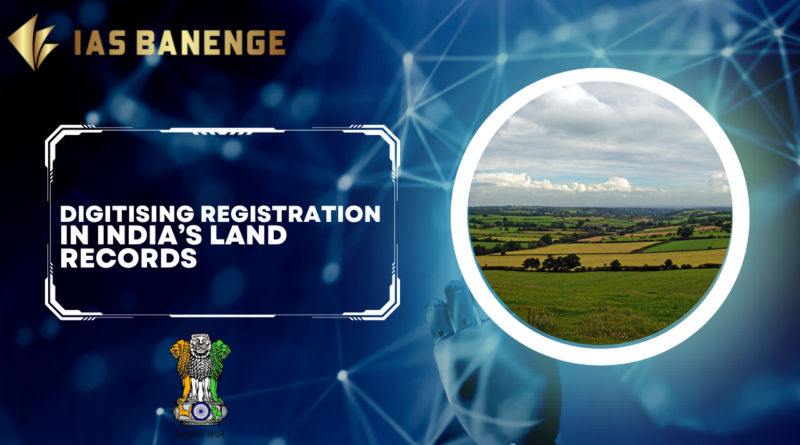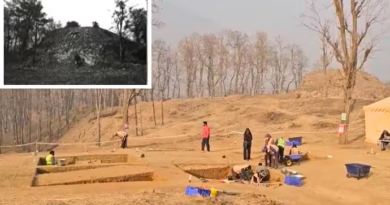Digitising Registration in India’s Land Records- Ias Banenge
Context:
Enabling remote online document registration would significantly help Digital India achieve its main goals.
Relevance:
GS paper-3: Land reforms in India: Science and Technology- developments and their applications and effects in everyday life.
READ MORE – Zero Shadow Day In Bangaluru-Ias Banenge
Mains Question
What are the benefits of digitising the land registration procedure in India, and what actions are necessary to ensure a reliable and effective system for secure land rights and real estate investment? (150 words).
Highlights
- Through the Digital India Land Records Modernization Programme (DILRMP), which aims to create an integrated land management system, India has actively taken steps in recent years to modernise its land records.
- The Bhu-Aadhaar or Unique Land Parcel Identification Number (ULPIN) project, one of the initiatives under this programme, assigns a 14-digit alpha-numeric identifier to land parcels based on their geo-coordinates.
- Despite these efforts, the government has yet to address the antiquated procedure of document registration, which is still governed by a colonial-era law passed in 1908. o It has the potential to bring transparency in land dealings and reduce the significant backlog of court cases involving land disputes.
Problems with the Current Registration Procedure
- The Registration Act of 1908 in India mandates that the majority of property documents be registered.
- The registration procedure in India still uses the archaic physical mode of registration, despite being a necessary formality for legal documentation.
- Parties to a transaction must physically appear at the sub-registrar’s office during the registration process in order to obtain registration certificates, submit physical copies of supporting documentation, and use physical fingerprints and photographs.
- As a result, registering documents at the sub-registrar’s office requires a lot of time; it frequently takes two days or longer to simply show up and submit the documents. To get to the closest registration office, parties frequently have to travel a great distance.
Modernization Is Required
- India needs to modernise its registration procedure in order to take full advantage of technological advancements and promote ease of living and conducting business.
- Although a lot of business and real estate documents can be completed electronically, the current manual registration process is slow and inefficient.
- Even in situations where electronic registration is permitted, parties may still be required to appear in person with the necessary documents.
- Some state governments have made attempts to introduce electronic registration by amending specific provisions of the Registration Act, but there is no consistent approach nationwide.
Changes to the Registration Act That Are Required for the Digital Transformation
- It is essential to amend the Registration Act in order to establish consistent online registration procedures across the nation.
- In addition, there should be online exchanges of questions/comments between parties and registrars, and registrars should be permitted to issue electronic registration certificates while maintaining a digital backup of such records.
- This should include provisions for online submission of documents, remote appearance of parties and witnesses, and electronic verification of parties through biometric authentication modes and live photo captures.
Maintaining Consistency
- Since the Constitution gives state governments the authority to amend state laws regarding registration, the central Act must establish minimum requirements for remote online registration in order to guarantee that registration is carried out safely and securely throughout India.
- To accomplish this, a new provision that establishes standards for identity authentication methods, security and storage, and an electronic record format should be introduced.By establishing this fundamental framework, registration offices will be able to standardise their data and procedures, which will make it easier to create a national land registry.
Putting Digital Transformation into Practise
- In light of the country’s widening digital divide, it’s critical that the government create a transition plan for enacting reforms that move towards online registration while taking the degree of digitization in each state into consideration.
- The state governments should be given a deadline in this plan to guarantee that registration offices have the necessary infrastructure to support remote online registration. Physical registration facilities should continue to be accessible until then.
Digital Transformation’s Advantages
- A fundamental legal requirement is that documents be registered. Modernising this procedure will be a major step towards the paperless, presence-free services that Digital India envisions.
- This change will speed up the registration process and make it more easily accessible, all while cutting down on the time and expenses involved. Land disputes can be reduced by streamlining the land ownership process.
- The digitization of land records will improve land use management by making it easier to identify land that is available for development and to monitor the land’s ecological stability.
Conclusion
- The digitalization of the land registration process is essential for modernising the management of land records in India.
- To ensure transparency, protect land rights, and encourage investment in the real estate market, a strong, effective, and modernised land registration system is required.
- Provisions for online registration, remote verification and certification, a uniform framework for electronic records, as well as standardisation of data and procedures, should be included in the necessary amendments to the Registration Act.The Indian people will gain a lot from this switch from paper-based to digital registration, which will also contribute to the realisation of the Digital India vision.





Pingback: Jupiter’s Moon Will Be Orbited First-Ias Banenge - Ias Banenge